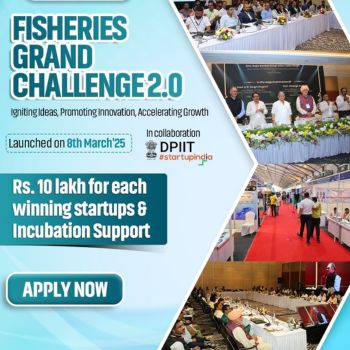Registrations are invited for Fisheries Startup Grand Challenge 2.0. The last date of registration is May 11.
Building on the success of the first edition of their challenge, Department of Fisheries in collaboration with Startup India, DPIIT is launching the second Fisheries Startup Grand Challenge with the aim to further promote innovation and support budding entrepreneurs in fisheries and aquaculture.
All startups are eligible to apply for the challenge. Also, Any Individual Having a relevant idea per the problem statements proposed may also apply.
Developing Nutritious and Affordable Aquaculture Feeds from Sustainable Sources
Aquaculture depends heavily on wild fish for feed, which threatens the sustainability of both aquaculture and wild fisheries. Overfishing for fishmeal and fish oil can deplete fish populations and harm ecosystems. To address this, we need to create affordable and eco-friendly feeds using alternative proteins like plants, insects, and microalgae that support fish growth and health while reducing environmental impact.
Enhancing Aquaculture Sustainability through AI-Powered Precision Farming
Traditional aquaculture practices often suffer from suboptimal resource utilization, disease outbreaks, and environmental pollution. Develop and deploy AI-powered solutions (e.g., Disease Detection and Management, Bycatch Reduction) to optimize feed delivery, monitor water quality in real-time, detect and prevent diseases, and minimize environmental impacts, leading to more efficient and sustainable aquaculture operations.
Building Resilient and Inclusive Seafood Supply Chains
Seafood supply chains often suffer from poor infrastructure, limited traceability, and inadequate market access for small-scale fishers. Additional challenges include low value addition, waste management issues, and food safety concerns. Developing innovative market solutions—such as blockchain technology for traceability, e-commerce platforms, direct-to-consumer models, and energy-efficient preservation techniques—can help connect fishers directly with consumers, improve price transparency, market expansion, and enhance the livelihoods of fishers and coastal communities.
Minimizing Waste and Maximizing Value in the Seafood Industry
Significant amounts of seafood waste are generated throughout the supply chain. Develop and implement innovative technologies (e.g., bioconversion, valorisation techniques) to convert seafood waste into valuable products (e.g., animal feed, biofuels, fertilizers) and minimize environmental pollution while creating new economic opportunities.
Integrating Traditional Knowledge with Modern Technology for Sustainable Fisheries
While traditional fishing practices possess valuable knowledge, they often lack the tools and technologies to thrive in a changing environment. Develop innovative solutions that integrate traditional fishing knowledge with modern technologies (e.g., remote sensing, GPS tracking, data analytics) to improve fishing efficiency, enhance resource management, and ensure the long-term sustainability of fish stocks.
Interested candidates can register online via this page.

